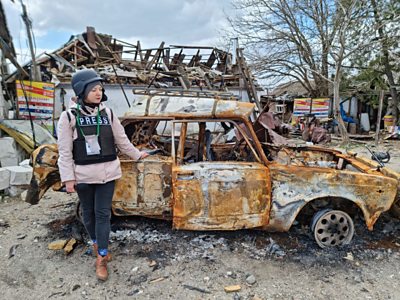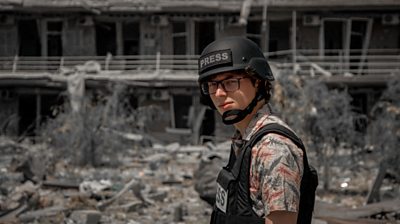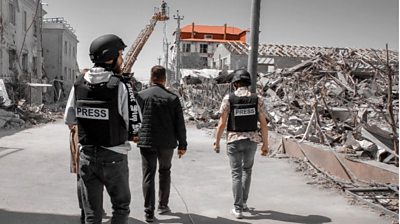How are Ukrainian journalists coping as they report amid the continuing war?
±«Óătv Media Action has been working with the Ukraine national broadcaster Suspilne (Public) for more than a decade, including providing Lifeline training, equipment and support to ensure its journalists and production teams can stay on air through the conflict.
Ahead of World Press Freedom Day, we asked two of their journalists, Svitlana Klosova and Dmytro Vasyliev, for their thoughts and reflections on where they were in these images, and how they are coping through a war at home.

Svitlana Klosova, a journalist for Suspilne (Public) in Mykolaiv, recalls her experiences of working on the frontline in Ukraine.
"Two months have passed since the beginning of the great war. I cannot say that I was already used to hostilities. It was painful to see destroyed buildings, burned people's property, and empty streets. But I tried to keep my emotions from interfering with my work while I was at the sites of Russian shelling. Emotions would return when I went home and took off the bulletproof vest. I felt like I was in a post-apocalyptic world. There were elegant houses, very beautiful, but they were broken and abandoned, some toys or household items reminded us that people lived there, built their lives, did repairs, drank coffee in their kitchen, and now all that remains are bricks, fragments. It was a little embarrassing to wander among the wreckage of someone else's life."

Dmytro Vasyliev, a journalist for Suspilne (Public) in Zatoka, reflects on his experience of being a war correspondent.
"It was 2022, the period of active shelling of Zatoka in the Odesa region. The recreation area was one of the first shootings in that settlement. We worked with local people and covered the scale of rocket attacks in the Odesa region. In the photo – is a destroyed recreation centre. By May, when this photo was taken, we had had time to get used to the new working conditions. I was more surprised by the degree of chaotic shelling carried out by the Russians. If the attacks were localized in a big city the destruction seemed completely unaimed here."
Press freedom means when a journalist is not limited in fulfilling their obligations, their function.”
We asked Marharyta Halich, a TV presenter for Suspilne (Public) Zaporizhzhia, in the country's east, to tell us what press freedom means to her.
It's vital for journalists to have access to accurate information, she said, and to be able to talk about topics which are more important to their audiences.
Even in wartime, she said climate and the environment is important to her audience in this industrial region. And one positive change has been that viewers now get in touch via online platforms – making it easier for she and her colleagues to respond to specific questions and help their communities in this turbulent time.
Watch to find out more.
±«Óătv Media Action has been delivering Lifeline training to Suspilne (Public) journalists across Ukraine to help them provide trusted content via TV, radio and digital platforms. This ensures that those living under fire can access the information they need when they need it.
±«Óătv Media Action has supported teams at Suspilne (Public) in Ukraine with training in the principles and techniques of Lifeline programming, with the support of USAID’s Bureau for Humanitarian Assistance.
